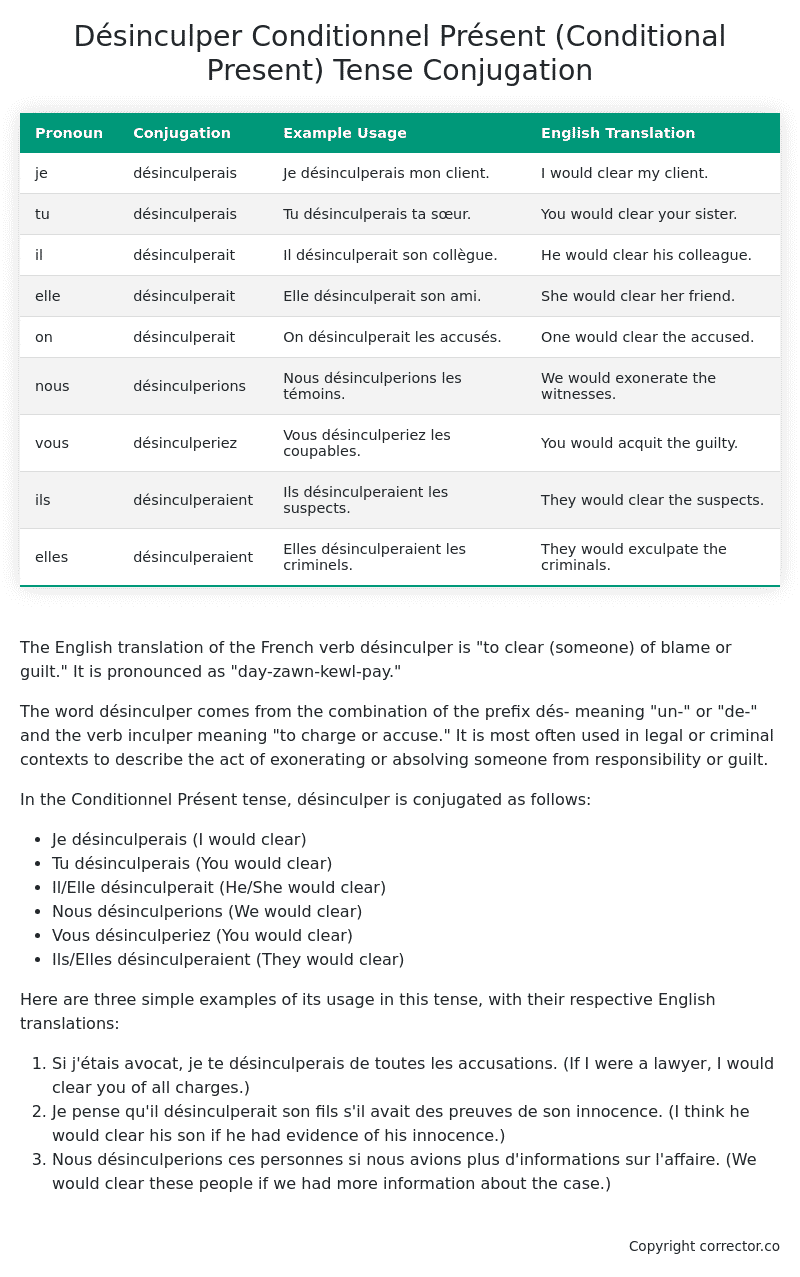Conditionnel Présent (Conditional Present) Tense Conjugation of the French Verb désinculper
Introduction to the verb désinculper
The English translation of the French verb désinculper is “to clear (someone) of blame or guilt.” It is pronounced as “day-zawn-kewl-pay.”
The word désinculper comes from the combination of the prefix dés- meaning “un-” or “de-” and the verb inculper meaning “to charge or accuse.” It is most often used in legal or criminal contexts to describe the act of exonerating or absolving someone from responsibility or guilt.
In the Conditionnel Présent tense, désinculper is conjugated as follows:
- Je désinculperais (I would clear)
- Tu désinculperais (You would clear)
- Il/Elle désinculperait (He/She would clear)
- Nous désinculperions (We would clear)
- Vous désinculperiez (You would clear)
- Ils/Elles désinculperaient (They would clear)
Here are three simple examples of its usage in this tense, with their respective English translations:
- Si j’étais avocat, je te désinculperais de toutes les accusations. (If I were a lawyer, I would clear you of all charges.)
- Je pense qu’il désinculperait son fils s’il avait des preuves de son innocence. (I think he would clear his son if he had evidence of his innocence.)
- Nous désinculperions ces personnes si nous avions plus d’informations sur l’affaire. (We would clear these people if we had more information about the case.)
Table of the Conditionnel Présent (Conditional Present) Tense Conjugation of désinculper
| Pronoun | Conjugation | Example Usage | English Translation |
|---|---|---|---|
| je | désinculperais | Je désinculperais mon client. | I would clear my client. |
| tu | désinculperais | Tu désinculperais ta sœur. | You would clear your sister. |
| il | désinculperait | Il désinculperait son collègue. | He would clear his colleague. |
| elle | désinculperait | Elle désinculperait son ami. | She would clear her friend. |
| on | désinculperait | On désinculperait les accusés. | One would clear the accused. |
| nous | désinculperions | Nous désinculperions les témoins. | We would exonerate the witnesses. |
| vous | désinculperiez | Vous désinculperiez les coupables. | You would acquit the guilty. |
| ils | désinculperaient | Ils désinculperaient les suspects. | They would clear the suspects. |
| elles | désinculperaient | Elles désinculperaient les criminels. | They would exculpate the criminals. |
Other Conjugations for Désinculper.
Le Present (Present Tense) Conjugation of the French Verb désinculper
Imparfait (Imperfect) Tense Conjugation of the French Verb désinculper
Passé Simple (Simple Past) Tense Conjugation of the French Verb désinculper
Passé Composé (Present Perfect) Tense Conjugation of the French Verb désinculper
Futur Simple (Simple Future) Tense Conjugation of the French Verb désinculper
Futur Proche (Near Future) Tense Conjugation of the French Verb désinculper
Plus-que-parfait (Pluperfect) Tense Conjugation of the French Verb désinculper
Passé Antérieur (Past Anterior) Tense Conjugation of the French Verb désinculper
Futur Antérieur (Future Anterior) Tense Conjugation of the French Verb désinculper
Subjonctif Présent (Subjunctive Present) Tense Conjugation of the French Verb désinculper
Subjonctif Passé (Subjunctive Past) Tense Conjugation of the French Verb désinculper
Subjonctif Imparfait (Subjunctive Imperfect) Tense Conjugation of the French Verb désinculper
Conditionnel Présent (Conditional Present) Tense Conjugation of the French Verb désinculper (this article)
Conditionnel Passé (Conditional Past) Tense Conjugation of the French Verb désinculper
L’impératif Présent (Imperative Present) Tense Conjugation of the French Verb désinculper
L’infinitif Présent (Infinitive Present) Tense Conjugation of the French Verb désinculper
Struggling with French verbs or the language in general? Why not use our free French Grammar Checker – no registration required!
Get a FREE Download Study Sheet of this Conjugation 🔥
Simply right click the image below, click “save image” and get your free reference for the désinculper Conditionnel Présent tense conjugation!

Désinculper – About the French Conditionnel Présent (Conditional Present) Tense
Formation
Common Everyday Usage Patterns
Expressing Polite Requests
Expressing Hypothetical Situations
Expressing Doubt or Uncertainty
Interactions with Other Tenses
Present Tense
Past Tense
Future Tense
Conditional Perfect
Summary
Want More?
I hope you enjoyed this article on the verb désinculper. Still in a learning mood? Check out another TOTALLY random French verb conjugation!


